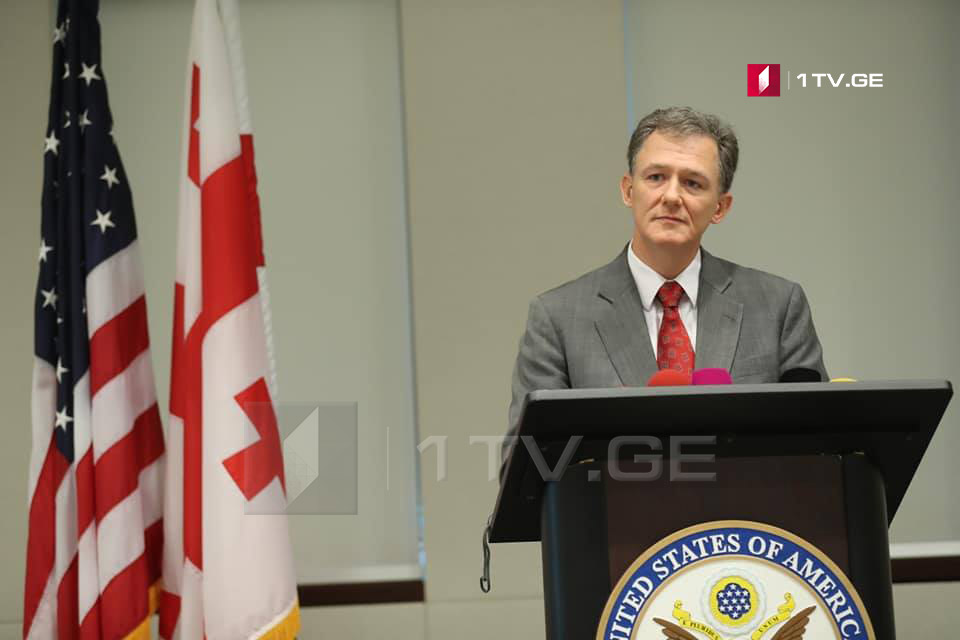
The United States continue to have a strategic interest in and support a democratic, prosperous, peaceful and secure South Caucasus, George Kent, Deputy Assistant Secretary of State for European and Eurasian Affairs stated at the online discussion by Turkish Heritage Foundation.
“I think that has been part of our policy for the entire generation. Now, 30 years to this year since the breakup of the Soviet Union and since Georgia, Armenia and Azerbaijan obtained their independence. I think while these are three relatively new countries in their current iterations, the leaders from all three countries share a long historical perspective and they have been struggling to find as nations their identity and their survival between the Triangle of Empires for centuries, if not millennia. Whether they were called Muscovy. The Persian and Ottoman Empire is whether it’s Russia, Soviet Union, now Turkey and Iran, the names change but I think the iron triangle of traditional outside influences endures.
That is that geography shapes some of the choices and options to all three countries. That east west corridor of infrastructure has been part of our strategic approach to help these countries succeed within the context, obviously, of markets elsewhere and supplies elsewhere. And so whether it is rail, whether it’s oil pipelines, whether it’s gas infrastructure, whether it’s multimodal transport and digging out deeper sea ports, I think this sort of East-West infrastructure has been a way both of offering a regional promise of cooperation, as well as, if you will, breaking out from historical destiny of the bigger powers to the north and south,” George Kent declared.
During the same discussion, the US diplomat spoke about the Nagorno Karabakh war and changed geopolitical situation in the region. US Deputy Assistant Secretary believes the US disagrees with the 3+3 cooperation platform proposed by Turkey and Russia.
“With the new realities look like a great geopolitical shift in the wake of the what is oftentimes called the second Karabakh war, I think what we have seen in the aftermath of that is several of those traditional external countries which include Turkey and Russia, putting an idea on the table that then was embraced by the third Iran and the so-called 3+3 framework.
And that is a different vision than the one that Western partners like the United States have been promoting for the past three decades. And it also would shift the framework approach for addressing regional issues.
All of our countries, minus Iran, are members of the Organization for Security and Cooperation in Europe. It has economic security and democratic development to basket’s the structures. And that has really been the framework approach to the issues of the South Caucasus for the past a generation.
The so-called 3+3 proposal is a very much different alternative vision. It would cut out the US and some other Western partners and really be driven by regional infrastructure through the South Caucasus, but oftentimes to the interest and benefit of the larger neighbors north and south,” George Kent added.
The US Deputy Assistant Secretary also stressed the so-called OSCE Minsk Group importance and said that Azerbaijan and Armenia should reach an agreement on the future status of Nagorno-Karabakh with the help of this group and within this framework.
“So the US will remain committed to working with the South Caucasus countries for their success, whether it is in economic development, whether it is in strong institutions that can help their country succeed, be accountable to their own people, bring justice to their own people, bring the conditions that will drive foreign direct investment as well as security on the security. I think the big challenge remains how to approach the Karabakh conflict in a way that allows the two countries and parties to reach a final agreement on the final status. Azerbaijan can be seen as having won the war, but that doesn’t solve the crisis and in the same way that Armenia arguably won the first war a quarter century ago.
Until now, the framework has been OSCE group of co-chair, led by the US, France and Russia, and I think some challenges are facing that mechanism and the parties.
I think it will remain key to what extent the two countries themselves are willing to enable the mechanism to help them reach an agreement. And I think the other issue that does remain open is Russia’s intent. They opted not to seek a sort of terms of the cease fire through the Minsk Group co-chair mechanism of which they are part. They went ahead and did it directly, not bilaterally, but trilaterally. So I think that remains also an open question. So I think to the extent that Armenia and Azerbaijan remain committed to seeking a peaceful resolution and seek the good offices of the Minsk co-chair process. The US remains willing and committed to helping the two countries find a path forward and that would then potentially open up all sorts of other opportunities.
I’m sure we will get into the agreement between Turkey and Armenia that was first reached in 2009 for potential opening, still unrealized 12 years later. That was in part because Azerbaijan said as long as Armenia or ethnic Armenian forces connected to Aqaba are occupying our seven districts or territories, there should be no forward movement. They no longer do. So I think that opens up an opportunity to resuming the promise or realizing the promise of that 2009 agreement,” George Kent declared.
By - Svetlana Alimova








